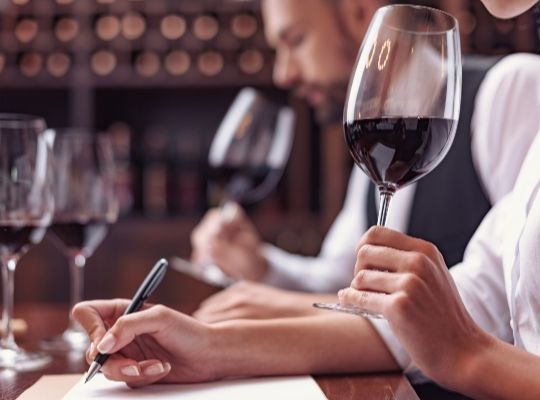
Wine Education: What is the real value of it?
Some of the questions we are frequently asked are: why should I take a wine course? What is its value to me? What will I gain from it?
I asked myself the very same question when I started my wine journey. Other than being a smug know-it-all, what was I actually going to gain from being able to tell the difference between Pouilly-Fume and Pouilly-Fuisse? As it turns out, a lot.
Prior to running the Essex Wine School I enjoyed wine socially but not with any degree of knowledge. Personally, I don’t enjoy not knowing about stuff – especially if I am drinking it. So, I embarked on the Wine & Spirits Education Trust (WSET) Level 2 course in Wines.
On day 1, my tutor asked me what I smelt in the glass of wine in front of me. My answer? Wine. Just wine. Fast forward to the end of the course and I had not only learnt to identify the vast array of wine aromas but I also had studied geography, geology, biology, culture, history, languages, chemistry, marketing and market forces. A globally encompassing, in-depth wine course that utterly captured my attention.
So what can you gain from it, as a wine enthusiast?
A wine course doesn’t mean a life-changing experience for everyone. It can simply arm you with the tools you need to make better, smarter wine buying choices.
Do you always buy the same trusted wine bottle in your weekly shop?
Do you take wine as a present based on it’s attractive label?
Do you always choose the second wine from the top on a restaurant wine list?
If some of these actions ring bells with you, and you’d like to change those buying habits, it could be that a wine course is exactly what is called for.
Professional wine courses are of equal benefit to the enthusiast as they are to the hospitality professional. You gain the skills to assess great wine from mediocre, determine value for money, recognise labelling terminology and work out what it means to you, the consumer – just as you do with the provenance of your meat or fish. You have the knowledge to discern a very average, mass-produced bottle from one made at a small-scale winery that focuses on great quality winemaking as much
as it does on the environmental wellbeing of its land and vineyards sites.
All of that means, that when you part with your hard-earnt cash on a bottle of wine, you know that you are equipped with the knowledge to make a great buying choice.
And how does it benefit a hospitality professional?
Here the benefit is clearer and more measurable. Put simply, armed with good quality, accurate and relevant knowledge you can engage with your customer in a more direct, clearer & more helpful manner. By imparting your knowledge you are illustrating that your customer is in good hands – you know all about your product & you are well informed. This knowledge, and the sharing of it with your client, directly boosts sales whether in a supermarket, specialist shop or restaurant scenario. It not
only boosts sales but also boosts the value of that sale. You customer is much more likely to feel confident and happy to pay more for a bottle of wine based on your wine knowledge.
Not only does education offer vastly improved sales, it can also add great
professional benefits to your personal credentials, setting you and your team apart from a very crowded industry.
There is still a lot of pomp and bluster in the wine industry – we prefer our students to have great quality wine education from the experts. If you have that, you don’t need ‘wine bravado’ – you can speak for yourself, with confidence, about wine.
What is the next step?
Firstly, work out what you want to gain from a wine course? Do you want a globally recognised qualification? Maybe you already know you enjoy Spanish or French wines and want something a little more focused on your interests?
Wines & Spirits Education Trust.
Through the WSET, Essex Wine School is an Approved Provide of WSET courses offering globally recognised qualifications in wines.
Level 1: A beginner level course aimed at introducing you to the key grapes and wine styles of the world.
Level 2: A beginner to intermediate level, with no prior knowledge needed. A more in-depth look at the key grapes of the world, the regions & styles, climate and geography.
Level 3: An advanced course requiring L2 knowledge. A detailed and thorough look at the grape growing and wine making, assessing quality and style through accurate tasting.
View all of our upcoming WSET courses here
Still not sure where to start?
Dip your toe in and join us on one of our evening courses, where we explore a particular style of wine or region...we have a range of events coming up in 2025, from A Taste of Italy to a Malbec Masterclass and plenty more in between!
*Thanks to our colleague Victoria Aldwinckle at Kent Wine School for assistance with this article.




